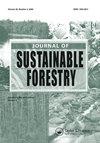加纳保护森林和森林资源的可持续发展:一个经验证据
IF 1.8
4区 农林科学
Q3 FORESTRY
引用次数: 1
摘要
摘要:随着人们对森林可持续发展和森林资源保护的日益关注,本研究应运而生。在受保护森林枯竭、气候变化和公共卫生问题日益严重的背景下,本研究通过竞标游戏的形式开发了一个可持续性指数,以显示加纳大阿克拉地区家庭对受保护森林的可持续性行为。根据家庭调查数据的横截面和回归分析,本研究发现,总体而言,约79%的受访者对GAR中的受保护森林表现出可持续的行为。此外,这种可持续的行为与每年80,837,594新台币(15,368,398美元)的预期收入有关。我们还发现,社会经济、心理和环境因素是加纳大阿克拉地区受保护森林可持续性的主要驱动因素。这项研究对加纳致力于维持受保护森林和森林资源的机构具有重要意义。本文章由计算机程序翻译,如有差异,请以英文原文为准。
Sustaining Protected Forests and Forest Resources in Ghana: An Empirical Evidence
ABSTRACT The increasing concern for sustainable forest and protected forest resources motivates this study. In the wake of rising protected forest depletion, climate change and public health problems, this study through a bidding game format develops a sustainability index to show households’ sustainability behavior toward the protected forests in the Greater Accra Region of Ghana. Relying on a cross-section of household survey data and regression analysis, this study finds that overall, approximately 79% of respondents exhibited sustainable behavior toward protected forests in GAR. Also, this sustainable behavior is associated with expected revenue of GH¢ 80,837,594 (USD$ 15,368,398) per annum. We also find that socioeconomic, psychological, and environmental factors are the main drivers of protected forest sustainability in the Greater Accra Region, Ghana. This study has important implications for institutions working toward sustaining protected forest and forest resources in Ghana.
求助全文
通过发布文献求助,成功后即可免费获取论文全文。
去求助
来源期刊

Journal of Sustainable Forestry
Social Sciences-Geography, Planning and Development
CiteScore
3.90
自引率
12.50%
发文量
42
期刊介绍:
Journal of Sustainable Forestry publishes peer-reviewed, original research on forest science. While the emphasis is on sustainable use of forest products and services, the journal covers a wide range of topics from the underlying biology and ecology of forests to the social, economic and policy aspects of forestry. Short communications and review papers that provide a clear theoretical, conceptual or methodological contribution to the existing literature are also included in the journal.
Common topics covered in the Journal of Sustainable Forestry include:
• Ecology, management, recreation, restoration and silvicultural systems of all forest types, including urban forests
• All aspects of forest biology, including ecophysiology, entomology, pathology, genetics, tree breeding, and biotechnology
• Wood properties, forest biomass, bioenergy, and carbon sequestration
• Simulation modeling, inventory, quantitative methods, and remote sensing
• Environmental pollution, fire and climate change impacts, and adaptation and mitigation in forests
• Forest engineering, economics, human dimensions, natural resource policy, and planning
Journal of Sustainable Forestry provides an international forum for dialogue between research scientists, forest managers, economists and policy and decision makers who share the common vision of the sustainable use of natural resources.
 求助内容:
求助内容: 应助结果提醒方式:
应助结果提醒方式:


